- Home
- Jack Canfield
A 2nd Helping of Chicken Soup for the Soul Page 3
A 2nd Helping of Chicken Soup for the Soul Read online
Page 3
Share These Stories with Others
You may have tangible wealth untold,
Caskets of jewels and coffers of gold.
Page xvii
Richer than I you could never be;
I know someone who told stories to me.
Cynthia Pearl Maus
Some of the stories you read will move you to share them with a loved one or a friend. When a story really touches you to the depths of your soul, close your eyes ever so briefly and ask yourself, "Who needs to hear this story right now?" Someone you care about may come to mind. Take the time to go to them or call them and share the story with them. You will get something even deeper for yourself from sharing the story with someone you care about. Consider the following from Martin Buber:
A story must be told in such a way that it constitutes help in itself. My grandfather was lame. Once they asked him to tell a story about his teacher. And he related how his teacher used to hop and dance while he prayed. My grandfather rose as he spoke, and he was so swept away by his story that he began to hop and dance and show how the master had done. From that hour on he was cured of his lameness. That's how to tell a story!
Consider sharing these stories at work, at church, synagogue or temple, and at home with your family. After sharing, discuss how the story affected you and why you were drawn to share it with them. And most important, let these stories inspire you to share your own stories.
Reading about, telling and listening to each others' stories can be very transformational. Stories are powerful vehicles that release our unconscious energies to heal, to integrate, to express and to grow. Hundreds of readers have told us about how the first book of Chicken Soup stories opened a floodgate of human
Page xviii
emotions and facilitated deep family and group sharings. Family members started recalling and relating important experiences in their lives and began to bring those to the dinner table, the family meeting, the classroom, the support group, the church fellowship and even the workplace.
One of the most valuable things we can do to heal
one another is listen to each other's stories.
Rebecca Falls
One teacher in Pennsylvania had her fifth-grade class collaborate to write their own Chicken Soup for the Soul book with moving stories from their own lives. Once the book was written and compiled, it was duplicated and circulated. It had a profound impact on both the students and their parents.
A manager at a Fortune 500 company told us she has started every staff meeting for a year with a story from Chicken Soup for the Soul.
Ministers, rabbis, psychologists, counselors, trainers and support group leaders have been beginning and ending their sermons and their sessions with stories from the book. We encourage you to do this too. People are hungry for this nurturance for the soul. It takes so little time and can have such a lasting impact.
We also encourage you to begin telling your stories to those around you. People may need to hear your story. As several stories in this book will point out, it may even save someone's life.
Sometimes our light goes out but is blown into flame by another human being. Each of us owes deepest thanks to those who have rekindled this light.
Albert Schweitzer
Page xix
There have been many people who have rekindled our lights over the years, and we are grateful to them. We hope that, in some small way, we will be part of rekindling your light and blowing it into a bigger flame. If we do, then we have been successful.
We would love to hear about your reaction to this book. Please write to tell us how these stories affect you. We also invite you to become part of our "network of upliftment." Please send us any stories and poems you think we should include in future volumes of Chicken Soup for the Soul. See page 313 for our address. We look forward to hearing from you. Until then . . . may you enjoy reading A 2nd Helping of Chicken Soup for the Soul as much as we have enjoyed compiling, editing and writing it.
JACK CANFIELD AND MARK VICTOR HANSEN
Page 1
1
ON LOVE
Life is a songsing it.
Life is a gameplay it.
Life is a challengemeet it.
Life is a dreamrealize it.
Life is a sacrificeoffer it.
Life is loveenjoy it.
Sai Baba
Page 2
Page 3
The Circus
That best portion of a good man's life,
His little, nameless, unremembered acts
Of kindness and of love.
William Wordsworth
Once when I was a teenager, my father and I were standing in line to buy tickets for the circus. Finally, there was only one family between us and the ticket counter. This family made a big impression on me. There were eight children, all probably under the age of 12. You could tell they didn't have a lot of money. Their clothes were not expensive, but they were clean. The children were well-behaved, all of them standing in line, two-by-two behind their parents, holding hands. They were excitedly jabbering about the clowns, elephants and other acts they would see that night. One could sense they had never been to the circus before. It promised to be a highlight of their young lives.
The father and mother were at the head of the pack standing proud as could be. The mother was holding her husband's hand, looking up at him as if to say, ''You're my knight in shining armor." He was smiling and basking in pride, looking at her as if to reply, "You got that right."
The ticket lady asked the father how many tickets
Page 4
he wanted. He proudly responded, "Please let me buy eight children's tickets and two adult tickets so I can take my family to the circus."
The ticket lady quoted the price.
The man's wife let go of his hand, her head dropped, the man's lip began to quiver. The father leaned a little closer and asked, "How much did you say?"
The ticket lady again quoted the price.
The man didn't have enough money.
How was he supposed to turn and tell his eight kids that he didn't have enough money to take them to the circus?
Seeing what was going on, my dad put his hand into his pocket, pulled out a $20 bill and dropped it on the ground. (We were not wealthy in any sense of the word!) My father reached down, picked up the bill, tapped the man on the shoulder and said, "Excuse me, sir, this fell out of your pocket."
The man knew what was going on. He wasn't begging for a handout but certainly appreciated the help in a desperate, heartbreaking, embarrassing situation. He looked straight into my dad's eyes, took my dad's hand in both of his, squeezed tightly onto the $20 bill, and with his lip quivering and a tear streaming down his cheek, he replied, "Thank you, thank you, sir. This really means a lot to me and my family."
My father and I went back to our car and drove home. We didn't go to the circus that night, but we didn't go without.
Dan Clark
Page 5
Shoes
As Gandhi stepped aboard a train one day, one of his shoes slipped off and landed on the track. He was unable to retrieve it as the train was moving. To the amazement of his companions, Gandhi calmly took off his other shoe and threw it back along the track to land close to the first. Asked by a fellow passenger why he did so, Gandhi smiled. "The poor man who finds the shoe lying on the track," he replied, "will now have a pair he can use."
Author Unknown
First quoted in The Little, Brown Book of Anecdotes
Page 6
Chase
There was a definite quiver in Chase's lower lip as he followed his mother down the long, descending sidewalk to the parking lot at the orthodontist's office. This was going to be the worst summer of any that the 11-year-old boy had known. The doctor had been kind and gentle with him, but the time had come for him to face the reality that he would be fitted with braces to correct a misalignment of his teeth. The correction would hurt, he couldn't eat hard or chewy foods,
and he thought he would be made fun of by his friends. No words passed between the mother and son as they drove back to the small, country home. It was only 17 acres, but it was a sanctuary for one dog, two cats, a rabbit and a multitude of squirrels and birds.
The decision to have Chase's teeth corrected had been a difficult one for his mother, Cindy. Having been divorced for five years, she was the sole provider for her young son. Little by little, she had saved up the $1,500 required to have the teeth corrected.
Then one sunny afternoon, the person she cared for the most, Chase, fell in love. Chase and his mother had gone to visit the Rakers, who were old family friends, at their farm about 50 miles away. Mr. Raker took them out to the barn and there she was. She held her head high as the trio approached. Her light mane
Page 7
and tail rippled on a gentle breeze. Her name was Lady, and she was everything a beautiful mare should be. She was saddled, and Chase had his first taste of horsemanship. There was an instant attraction, which seemed to be mutual.
"She is for sale, if you want to buy her," Mr. Raker had told Cindy. "For $1,500 you get the mare, all the papers on her and the horse trailer to haul her." For Cindy, it was a big decision. The $1,500 she had saved would fix Chase's teeth or buy Lady for Chase, but it wouldn't do both. Finally, she determined that getting the braces was the best long-term decision for Chase. It was a tearful decision for both mother and son. But Cindy promised to take Chase to the Raker farm to see Lady and ride her as often as they could.
Chase reluctantly began his long torturous course of treatment. With little courage and a low tolerance for pain, Chase submitted himself for the impressions, fittings and never-ending tightening of the expanders. He gagged, cried and pleaded, but the orthodontic correction went ahead. The only shining moments of Chase's life that summer came when his mother took him to ride Lady. There, he was free. Horse and rider would go galloping into the big pastures and into a world that knew no pain or suffering. There was only the steady rhythm of the horse's hooves on the sod and the wind in his face. Riding Lady, Chase could be John Wayne, "tall in the saddle," or one of the knights of old, off to rescue the fair maiden in distress, or anything his imagination let him be. At the end of his long rides, Chase and Mr. Raker would rub down Lady, clean her stall and feed her, and Chase would always give his new friend lumps of sugar. Cindy and Mrs. Raker spent their afternoons together making cookies and lemonade,
Page 8
and watching Chase ride his new best friend.
The goodbyes between Chase and the mare lasted as long as Cindy would permit. Chase would hold the horse's head in his hands, and then rub her strong shoulders and comb his fingers through her mane. The gentle animal seemed to understand the affection given to her and would stand patiently, now and then nipping at his shirt sleeve. Each time they left the Raker farm, Chase feared that this might be his last look at the mare. Lady was, after all, for sale, and the market was good for that quality of riding stock.
The summer wore on with repeated tightening of the expander in Chase's mouth. All of the discomfort would be worth it because this would make room for his yet undescended teeth to come in, he was told. Still, there was the agony of food particles trapped by the appliance, and that ever-constant pain of his facial bones stretching. All of the $1,500 would soon be used up on his dental work, and nothing would remain with which to purchase the mare he loved so much. Chase asked his mom countless questions, hoping for an answer that would eventually satisfy him. Could they borrow the money to buy the mare? Would Grandpa help them buy her? Could he get a job and save his money to buy the horse? His mother fielded the questions as best she could. And when all else failed, she would quietly slip away to shed her own tears, that she could not provide for all the wants of her only child.
A crisp September morning brought the opening of school, which also brought the big yellow school bus to the end of the lane at Chase's home. The school-children took turns recounting the things they did during summer vacation. When his turn came, Chase talked about other subjects, but he never mentioned the golden-colored mare named Lady. The last chapter in that story had not yet been written, and he was
Page 9
afraid of how it would end. The battle with the stretching appliance in his mouth had been won, and the less obtrusive retainer had taken its place.
With eager anticipation, Chase looked forward to the third Saturday, when his mother had promised to take him to the Rakers' to ride Lady. Chase was up early on the appointed day. He fed his rabbits, dogs and cats, and even found time to rake leaves in the backyard. Before Chase and his mother left the house, he filled his jacket pocket with sugar cubes for the golden-maned mare, who he knew would be waiting for him. To Chase, it seemed an eternity before his mother turned the car off the main road and down the lane to the Raker farm. Anxiously, Chase strained his eyes for a glimpse of the mare that he loved so much. As they drew closer to the farm house and barns, he looked, but Lady was nowhere to be seen. Chase's pulse pounded as he looked expectantly for the horse trailer. It was not there. Both the trailer and horse were gone. His worst nightmare had become a reality. Someone had surely bought the horse, and he would never see her again.
Chase began to feel an emptiness in the pit of his stomach that he had never known before. They got out of the car and ran up to the front door of the house. No one answered the doorbell. Only the big collie, Daisy, was there with tail wagging to greet them. While his mother sadly looked on, Chase ran to the barn where the mare had been kept. Her stall was empty, and the saddle and blanket were also gone. With tears streaming down his cheeks, Chase returned to the car and got in. "I didn't even get to say goodbye, Mom," he whimpered.
On the drive back home, both Cindy and Chase sat quietly with their own thoughts. The wound of losing his friend would be slow to heal, and Chase only
Page 10
hoped that the mare would find a good home with someone to love and take care of her. She would be in his prayers, and he would never forget their carefree times together. Chase's head was bowed and his eyes closed as Cindy pulled into the driveway of their home. He did not see the red, shiny horse trailer by their barn, or Mr. Raker standing beside his blue pickup truck. When Chase finally looked up, their car had stopped and Mr. Raker was opening Chase's door. "How much money have you got saved up, Chase?" he asked.
This could not be real. Chase rubbed his eyes in disbelief. "Seventeen dollars," he answered in a halting voice.
"That's just what I wanted for this mare and trailer," said a smiling Mr. Raker. The transaction that followed would have rivaled any on record for speed and brevity. In only moments, the new, proud owner was climbing into the saddle, astride his beloved mare. Horse and rider were soon out of sight around the barn, headed for the open pasture beyond.
Mr. Raker never explained his actions, other than to say, "This is the best I have felt in years!"
Bruce Carmichael
Page 11
Rescue at Sea
Years ago, in a small fishing village in Holland, a young boy taught the world about the rewards of unselfish service. Because the entire village revolved around the fishing industry, a volunteer rescue team was needed in cases of emergency. One night the winds raged, the clouds burst and a gale force storm capsized a fishing boat at sea. Stranded and in trouble, the crew sent out the S.O.S. The captain of the rescue rowboat team sounded the alarm and the villagers assembled in the town square overlooking the bay. While the team launched their rowboat and fought their way through the wild waves, the villagers waited restlessly on the beach, holding lanterns to light the way back.
An hour later, the rescue boat reappeared through the fog and the cheering villagers ran to greet them. Falling exhausted on the sand, the volunteers reported that the rescue boat could not hold any more passengers and they had to leave one man behind. Even one more passenger would have surely capsized the rescue boat and all would have been lost.

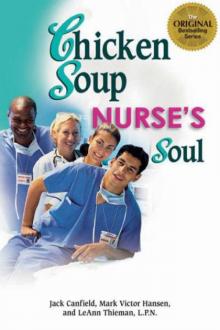 Chicken Soup for the Nurse's Soul: Second Dose
Chicken Soup for the Nurse's Soul: Second Dose Chicken Soup for the Ocean Lover's Soul
Chicken Soup for the Ocean Lover's Soul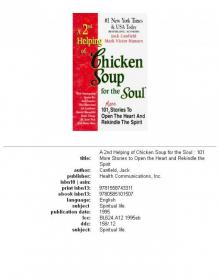 A 2nd Helping of Chicken Soup for the Soul
A 2nd Helping of Chicken Soup for the Soul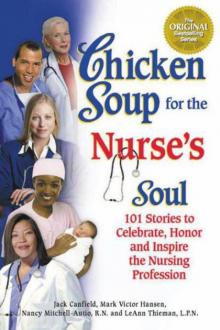 Chicken Soup for the Nurse's Soul
Chicken Soup for the Nurse's Soul Chicken Soup for the Breast Cancer Survivor's Soul
Chicken Soup for the Breast Cancer Survivor's Soul Chicken Soup for the Pet Lover's Soul
Chicken Soup for the Pet Lover's Soul Chicken Soup for the Bride's Soul
Chicken Soup for the Bride's Soul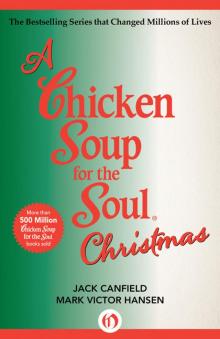 A Chicken Soup for the Soul Christmas
A Chicken Soup for the Soul Christmas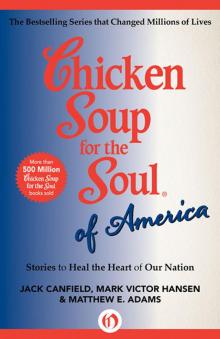 Chicken Soup for the Soul of America
Chicken Soup for the Soul of America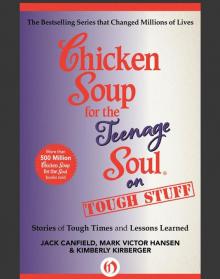 Chicken Soup for the Teenage Soul on Tough Stuff
Chicken Soup for the Teenage Soul on Tough Stuff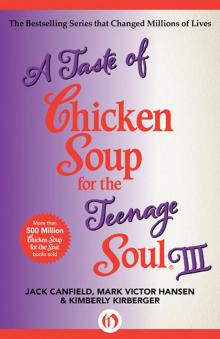 A Taste of Chicken Soup for the Teenage Soul III
A Taste of Chicken Soup for the Teenage Soul III Chicken Soup for Every Mom's Soul
Chicken Soup for Every Mom's Soul Chicken Soup for the Dog Lover's Soul
Chicken Soup for the Dog Lover's Soul A Second Chicken Soup for the Woman's Soul
A Second Chicken Soup for the Woman's Soul Chicken Soup for the Soul the Book of Christmas Virtues
Chicken Soup for the Soul the Book of Christmas Virtues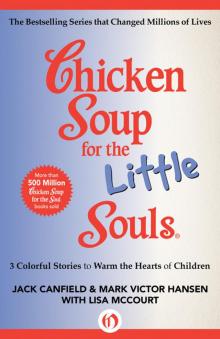 Chicken Soup for the Little Souls: 3 Colorful Stories to Warm the Hearts of Children
Chicken Soup for the Little Souls: 3 Colorful Stories to Warm the Hearts of Children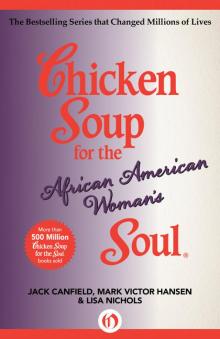 Chicken Soup for the African American Woman's Soul
Chicken Soup for the African American Woman's Soul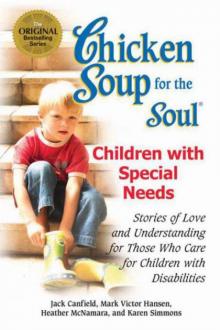 Chicken Soup for the Soul
Chicken Soup for the Soul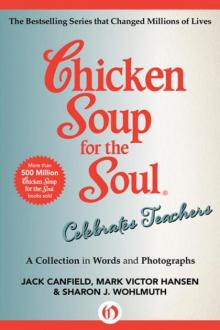 Chicken Soup for the Soul Celebrates Teachers
Chicken Soup for the Soul Celebrates Teachers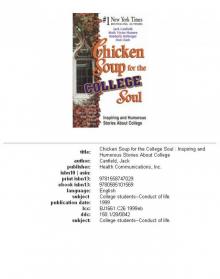 Chicken Soup for the College Soul
Chicken Soup for the College Soul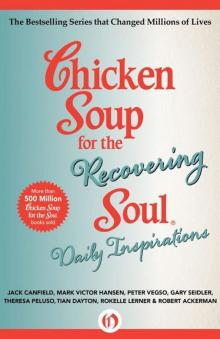 Chicken Soup for the Recovering Soul Daily Inspirations
Chicken Soup for the Recovering Soul Daily Inspirations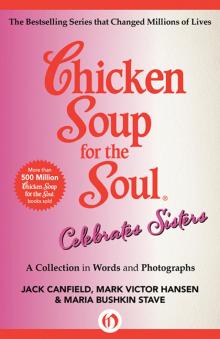 Chicken Soup for the Soul Celebrates Sisters
Chicken Soup for the Soul Celebrates Sisters Chicken Soup for the Dieter's Soul
Chicken Soup for the Dieter's Soul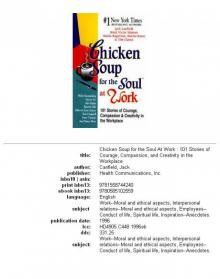 Chicken Soup for the Soul at Work 101 Stories of Courage
Chicken Soup for the Soul at Work 101 Stories of Courage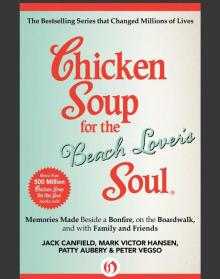 Chicken Soup for the Beach Lover's Soul
Chicken Soup for the Beach Lover's Soul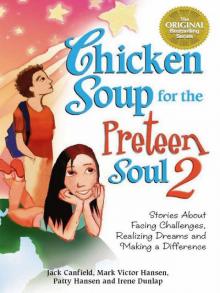 Stories About Facing Challenges, Realizing Dreams and Making a Difference
Stories About Facing Challenges, Realizing Dreams and Making a Difference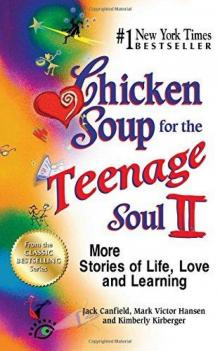 Chicken Soup for the Teenage Soul II
Chicken Soup for the Teenage Soul II Chicken Soup for the Girl's Soul
Chicken Soup for the Girl's Soul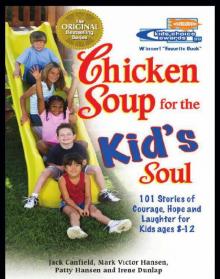 Chicken Soup for the Kid's Soul: 101 Stories of Courage, Hope and Laughter
Chicken Soup for the Kid's Soul: 101 Stories of Courage, Hope and Laughter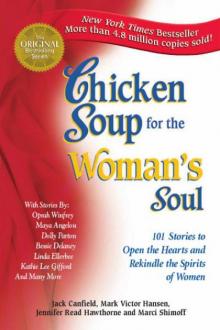 Chicken Soup for the Woman's Soul
Chicken Soup for the Woman's Soul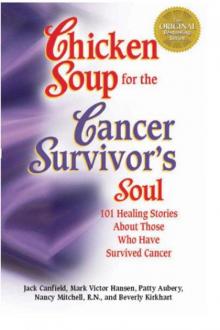 Chicken Soup for the Cancer Survivor's Soul
Chicken Soup for the Cancer Survivor's Soul Chicken Soup for the Canadian Soul
Chicken Soup for the Canadian Soul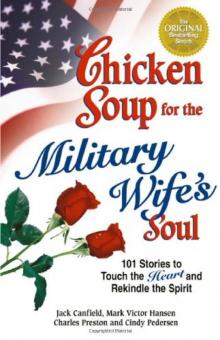 Chicken Soup for the Military Wife's Soul
Chicken Soup for the Military Wife's Soul A 4th Course of Chicken Soup for the Soul
A 4th Course of Chicken Soup for the Soul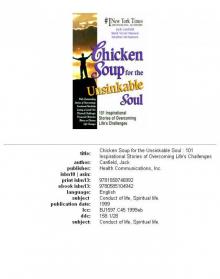 Chicken Soup Unsinkable Soul
Chicken Soup Unsinkable Soul Chicken Soup for the Soul: Christmas Magic
Chicken Soup for the Soul: Christmas Magic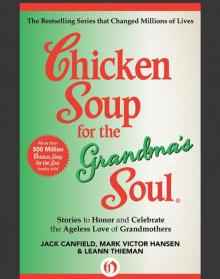 Chicken Soup for the Grandma's Soul
Chicken Soup for the Grandma's Soul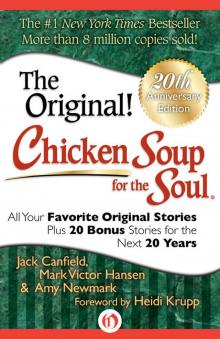 Chicken Soup for the Soul: All Your Favorite Original Stories
Chicken Soup for the Soul: All Your Favorite Original Stories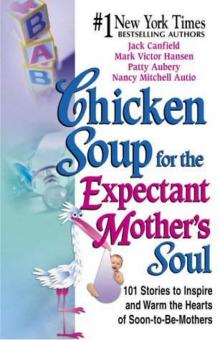 Chicken Soup for the Expectant Mother's Soul
Chicken Soup for the Expectant Mother's Soul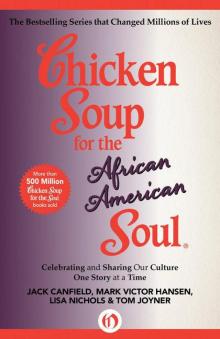 Chicken Soup for the African American Soul
Chicken Soup for the African American Soul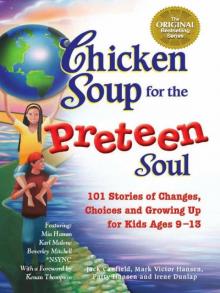 101 Stories of Changes, Choices and Growing Up for Kids Ages 9-13
101 Stories of Changes, Choices and Growing Up for Kids Ages 9-13 Christmas Magic
Christmas Magic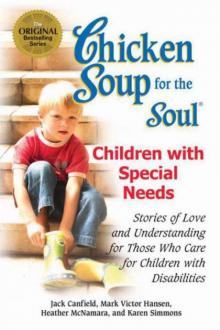 Chicken Soup for the Soul: Children with Special Needs
Chicken Soup for the Soul: Children with Special Needs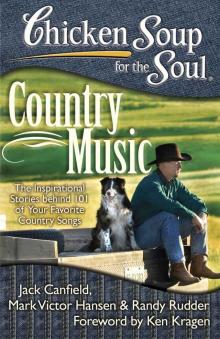 Chicken Soup for the Soul: Country Music: The Inspirational Stories behind 101 of Your Favorite Country Songs
Chicken Soup for the Soul: Country Music: The Inspirational Stories behind 101 of Your Favorite Country Songs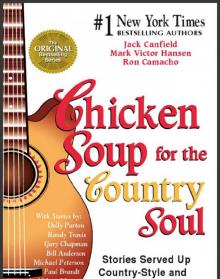 Chicken Soup for the Country Soul
Chicken Soup for the Country Soul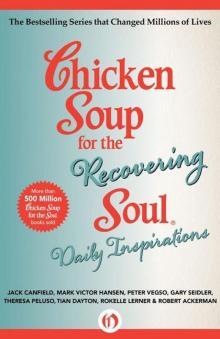 Chicken Soup for the Recovering Soul Daily Inspirations (Chicken Soup for the Soul)
Chicken Soup for the Recovering Soul Daily Inspirations (Chicken Soup for the Soul)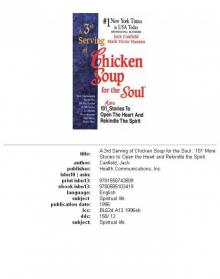 A 3rd Serving of Chicken Soup for the Soul
A 3rd Serving of Chicken Soup for the Soul The Book of Christmas Virtues
The Book of Christmas Virtues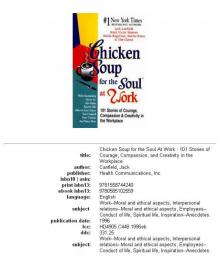 Chicken Soup for the Soul at Work
Chicken Soup for the Soul at Work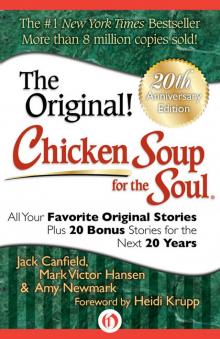 Chicken Soup for the Soul 20th Anniversary Edition
Chicken Soup for the Soul 20th Anniversary Edition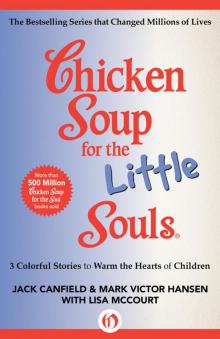 Chicken Soup for the Little Souls
Chicken Soup for the Little Souls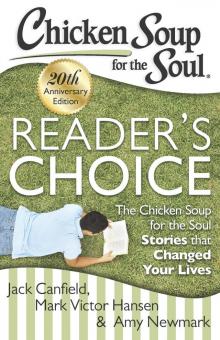 Chicken Soup for the Soul: Reader's Choice 20th Anniversary Edition
Chicken Soup for the Soul: Reader's Choice 20th Anniversary Edition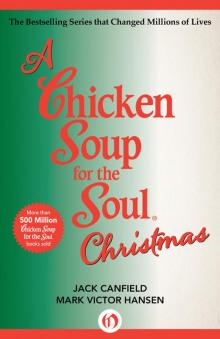 Chicken Soup for the Soul Christmas
Chicken Soup for the Soul Christmas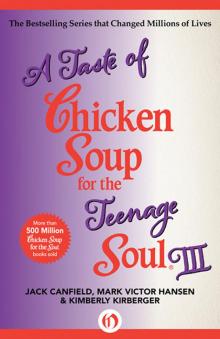 Taste of Chicken Soup for the Teenage Soul III
Taste of Chicken Soup for the Teenage Soul III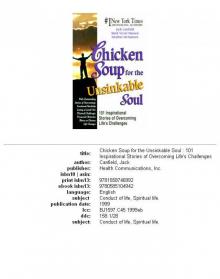 Chicken Soup for the Unsinkable Soul
Chicken Soup for the Unsinkable Soul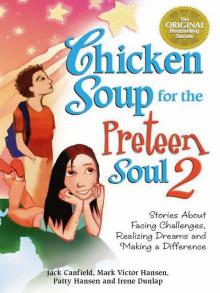 Chicken Soup for the Preteen Soul II
Chicken Soup for the Preteen Soul II